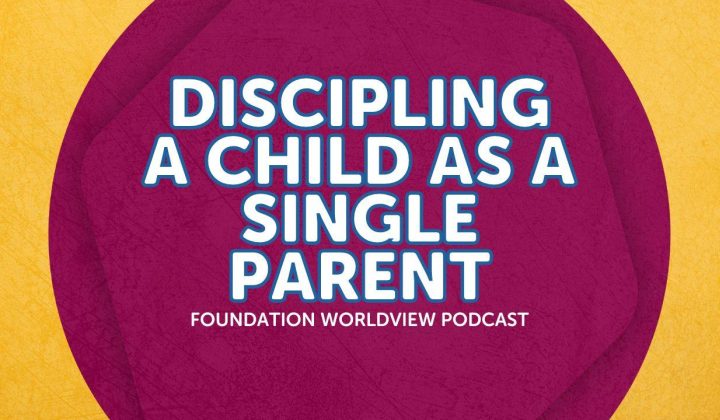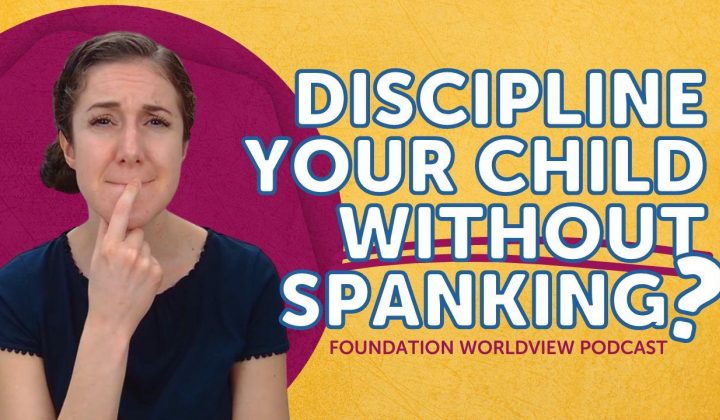Learn more about the journey that led to us equipping kids to carefully evaluate every idea they encounter.
Meet members of our team who have contributed to curriculum development.
Hear from real users of the Foundation Curriculum.
Learn what we believe about God, Jesus, Scripture, and more.
When Children Lie: How to Address Deception in Your Kids
In this episode, we discuss practical ways to address lying in children. Explore how to biblically confront sin struggles, guide them toward repentance, and establish both consequences and trust-building strategies, all while staying consistent in parenting.
Transcript
Note: The following is an auto-transcript of the podcast recording.
Hello, friends. Today's question says, "any advice on training children? To be truthful, I feel like I have totally failed in this area. My children lie to us tons and I don't know how to tackle it. They know that God is truth and Satan is the father of all lies. They know the commandments. I don't know what to do." Which I'm sure many listeners have felt this pain, whether it's the situation with lying or just another area where our kids have a sin struggle. So looking at how do we directly address areas of sin, struggle with our children is what we're going to dive down deep into today on the Foundation Worldview Podcast where we answer your questions so that you can equip the children that God has placed in your care to carefully evaluate every idea they encounter and understand the truth of the biblical worldview. I'm your host, Elizabeth Arnos. I'm thrilled that you've joined me for this episode today.
Now, something I would say to the questioner and to all parents who are watching and listening is, remember, parenting is a marathon, not a sprint. Those of you who are faithful Foundation Worldview listeners, you know that I am not a parent. I'm single. I'm not married. I don't have children of my own, that my area of expertise is in the classroom. And so that's how I got into this ministry. So I don't know from personal experience how wearying it can be to parent children through prolonged sin struggles, but parenting really is a marathon that doesn't end until Jesus returns or until God calls us home. It looks different in different phases, but we are always going to be seeking what is best for our children. And even once they're adults, we're not going to be parenting them anymore, but we are going to be praying for them and hopefully involved in their lives. So that would be my first encouragement. Just remember, this is a marathon. It's not a sprint. You may want to see results tomorrow, but the results from the efforts that you put in, they might not grow into fruition for months or weeks, sometimes even years or decades. So just remember this.
Now before ice go into what we should do when our children have a specific sin struggle like lying. I do want to address one aspect of this question, and now I may have understood the question or completely wrong because all I have are these few sentences that he or she wrote in. I don't have the opportunity to talk with him or her, but I think there might be a little bit of a misunderstanding in your children actually knowing what truth is. So in this question it says they know that God is truth. Now, it is true that God is the source of truth, but I do not think it is completely accurate to use God as the definition of truth. Let me explain. I do think that the Bible shows us that all truth ultimately stems from God, that God is the source of that truth. That is where truth comes from. But I do not think using God as a definition of truth is correct because when we're talking about truths, scientific truths or mathematic truths or truths about history or things like that, when we talk about them, we don't say that God is the answer. When your kid takes a math test and it says three times four, if they write God in the answer box, you're going to say yes, God did create three times four, and he sustains that equation. But God is not the answer to three times four. 12 is the answer to three times four.
And the reason I think we sometimes as Christians get confused and just say God is truth is because of John 14:6 where Jesus says, I am the way, the truth and the life. And I think when we read John 14:6 in context, it makes sense what Jesus is saying here. So we're going to read briefly just John chapter 14 verses five through seven. And these verses say, "Thomas said to him, "Lord, we don't know where you are going, so how can we know the way?" Jesus answered, "I am the way and the truth and the life. No one comes to the Father except through me. If you really know me, you will know my Father as well. From now on, you do not know him. (Sorry, from that's completely incorrect.) From now on you do know him and have seen him." So in this passage where Jesus says, I am the way, the truth and the life, no one comes to the Father except through me. What he is saying in this full context is that he is the true representation of the Father, that he has shown us accurately who God is, and he is the true and only way to God. So this passage in context is revealing Jesus is a true representation of the Father and the true and only way to God.
So we can help our children understand that God is the source of truth, meaning that all truth stems from him. But a more accurate definition for our children would be truth is what is real. Those of you who have taken the children in your care through our Biblical Worldview curriculum, our Comparative Worldview curriculum or our Careful Thinking curriculum, so any curriculum in our Biblical Thinking track, the first five lessons in each of those curriculums is solely focused on the concept of truth. And that truth is what is real. So if any of you watching or listening have not checked out those curriculums yet, highly recommend you check them out. The first unit in all three of them is focused on truth because we really want to ground our children in an understanding of what truth is, how truth is opposed to lies, and how truth is different than subjective feelings.
Now, as we think through the question of children lying, what do we do practically when our children are in the habit of lying or when they have any other sinful habit? I think there's several steps that we need to go through. First, when we discover our children have lied, we need to confront them about it. Now, when I talk about lying, if your children have another sin struggle and it's not lying, maybe it's anger, maybe it's hitting, maybe it's being manipulative. Just fill in the blank anytime I talk about lying. So for this questioner, when you discover that your children have lied to you, you need to confront them about it. Okay? Sometimes in certain countries, specifically in the US and I think several other English speaking countries, we tend to be a little bit of passive aggressive, and we don't necessarily always confront someone when they've done something that's sinful, where that's just a disservice to our children if we don't confront them. So when we discover our children have lied, we need to confront them about them, and we need to explain that they have sinned against us and they have sinned against God, and therefore our relationship with them is now hindered. It's not broken. It's not like they have no relationship with us. That relationship will always be there, but it is hindered and for us as Christians, it's similar. When we are Christians, our relationship with God is never broken. We're always redeemed by Jesus, but our relationship with him is hindered when we sin, and then we need to explain to them that we love them and that we are ready to forgive them when they are ready to repent. We're standing there with arms wide open. We're ready to forgive them, but they are the ones who need to choose to repent and turn from that sin. And then if they're ready, we need to walk them through that process of repenting of them actually naming what they did, telling you that it was wrong, saying that they're sorry and asking for your forgiveness.
And so then once we've confronted them and walked them through this process of confession and repentance, then we need to establish both a direct punishment and natural consequences. Now, I know that in today's day and age in parenting, it is not popular to use the word punishment. It's more popular to use the word discipline. Now, I'm okay with using the word discipline. The Bible uses the word discipline, but punishment is also a biblical word. It's also an okay word to use because I think our children, we do our children a disservice when they don't understand that they are being punished for something, because sin always leads to a punishment. The punishment for lying or for some other sinful habit could be that a privilege is removed or they have to go to bed early, something like that. So we need to make sure that they understand that there is a punishment for that. And then we also need to make sure that there are natural consequences, which I think sometimes punishments and natural consequences are different, that the punishment is put in place so that our children are given an actual physical reminder, oh, I sinned against God. I sinned against my parents. This was wrong. I need to work on this. I need to not do this again. Then the natural consequences is whatever naturally stems from the sinful decision that they made, for example, if they've gotten into the habit of lying to you. Now the example I'm going to give is if they're in the habit of lying, if they're in the habit of telling you the truth and they lie one time, I'm not saying implement this natural consequence because I don't think it's a natural consequence if they lie one time. But if they're in the habit of lying to you, a natural consequence will be you not trusting them when they tell you something, and so that you're showing them that they've broken down this trust. For example, if you have a second grader or a third grader who's in the habit of lying to you and you say, okay, before you can go outside and play, you need to do your homework, and then they come and say, I did my homework. You say, okay, you know what? I actually need to see your homework and that you explain because you have consistently lied to me. I can't trust that you're telling me the truth, so I need to see your homework. And then that you explain that trust is earned, and that as they show you that they're consistently telling you the truth, that trust will be built back up to show them this isn't a natural consequence that's going to last forever, but it is a natural consequence that's going to last for a little while. Or if you have a child that's a little bit older and they say, a friend invited them over, can they go over to that friend's house tomorrow afternoon? You say, you know what? I'm actually going to need to call Mrs. So-and-so to make sure that you've been invited over because you've been in the habit of lying to me, and so I can't trust you. I wish I could, but you're going to have to earn that trust back by showing me that you can tell me the truth. Okay? So again, the steps we need to make sure that we're confronting them about their sin, that we're walking them through the process of confession and repentance. Then we're establishing both a direct punishment and natural consequences.
And then it's so important that we're praying for them in this, that we're praying that God would soften their hearts because only God can take a heart of stone and turn it into a heart of flesh. We can make sure the elements for growth are in place, but we cannot change our children's hearts. So it's so important that we pray for them that God would change their hearts, that he would be working on their hearts so that they no longer desire to lie or to do whatever this sin struggle is that they have.
I think something else that's really helpful is if you could share with your children sin struggles that you had as a child, and then give some examples of how your parents helped you overcome that. Or if you didn't come from a Christian home, how God helped sanctify you once you became a Christian and you were still struggling with that sin. I know that as a child, my mom told us multiple stories about times from her growing up when she sinned against her parents or sinned against her siblings and what happened. And for me as a child that was so helpful for a number of reasons. One, it really helped me relate to my mom because I didn't think of my mom just as this perfect person. I realized, oh, she was a kid once. She felt and thought the different things that I feel and the different things that I think, and that she was tempted to lie or to be unkind or to manipulate, it was just so helpful for relatability. And it also gave me an example to follow. My mom did this, and then this was the consequence. I don't want that to be a consequence for me. I shouldn't do that. So I think it's really helpful when we can share with our children sin struggles that we've had as children, and then how our parents helped us overcome them, or if they didn't, how God sanctified us as we became Christians.
And just as a reminder, I already said this at the beginning, but just remember that parenting is a marathon. It's not a sprint. So be consistent. So, consistency is so important if we want to help actually change our children's behavior and get to the heart of what they're doing, because if your children are continually lying to you and you think, okay, these are some great steps, so I'm going to go through these, I'm going to confront them. I'm going to have a punishment and natural consequences. I'm going to pray for them. And then you do that once and then after that you kind of forget about it. They're probably not going to be transformed through what you do, but consistency is so important.
Well, that's a wrap for this episode, but if you have a question that you would like for me to answer on a future Foundation Worldview podcast, you can submit that by going to FoundationWorldview.com/podcast. Please also, if you've found the content of this podcast beneficial, please take the few seconds that it takes to just give us a rating and a review. Really appreciate that. And then as we leave our time together, my prayer for you is the same as always, and no matter the situation that you and the children, God is placed in your care, find yourselves. You would trust that God is working all things together for your good by using all things to conform you more into the image of His Son. I'll see you next time.
Related Posts and insights

How To Disciple Your Child as a Single Parent
Today's question says, "How do I disciple my child as a single parent?" Listen as Elizabeth Urbanowicz answers this question in a way that is not only beneficial for the single parent but also for anyone that is part of the body of Christ.

Talking To Kids About Their Sin Nature without Damaging Their Self-Esteem
In this episode of the Foundation Worldview podcast, host Elizabeth Urbanowicz answers a question that many Christian parents may have: how do we teach young children about their value and worth to God while also discussing the concept of sin?

Discipline Your Child Without Spanking?
Is it okay to discipline children without spanking? To answer this question, Elizabeth Urbanowicz explores the goals in disciplining our children according to what we find in scripture and then discusses the positives and negatives of spanking itself. Plus, she'll talk about why it's important to consider alternate methods of discipline and the individual personality of your child when trying to accomplish the goal of discipline.




